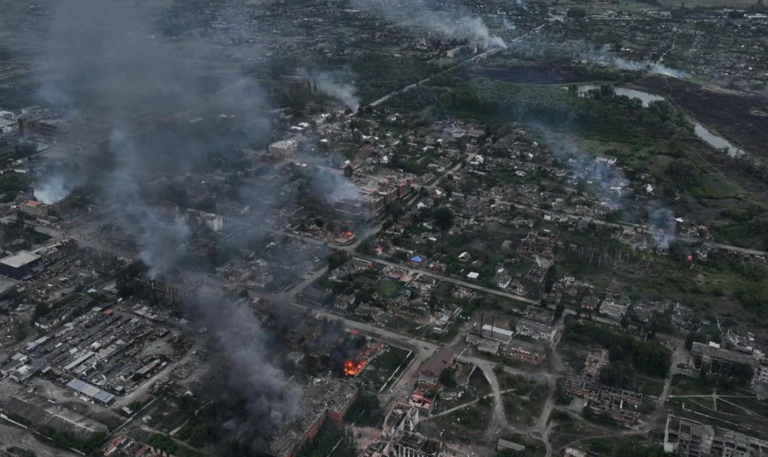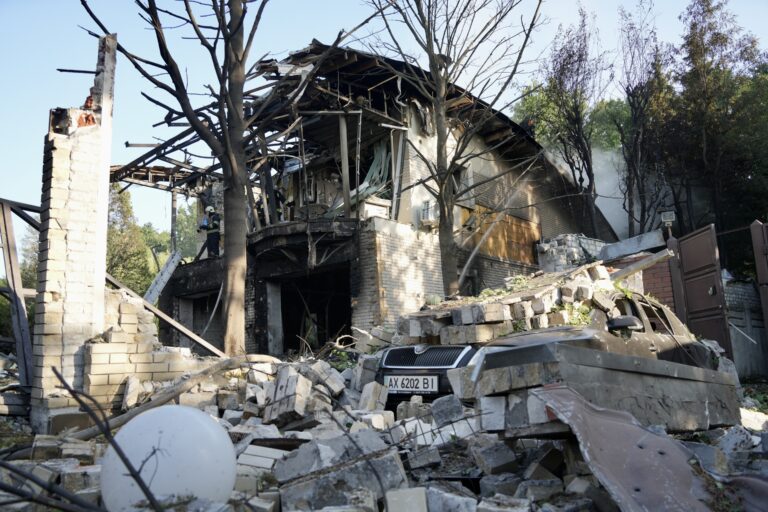Russian missile strikes hit one of the largest heat power plants in Kharkiv Oblast on March 22, as continued delays in U.S. security assistance weaken Ukraine’s air defense system and increase Russia’s ability to cause significant damage to Ukraine’s power grid, according to researchers at the U.S.-based Institute for the Study of War (ISW).
The Institute cites a report by the Ukrainian energy company Centrenergo that on March 22, Russian missile strikes destroyed all power generating blocks and support equipment at the Zmiyiv heat and power plant in Kharkiv Oblast.
Russian troops conducted the most extensive series of combined missile and drone strikes on Ukrainian energy infrastructure on the night of March 21-22 since the start of the full-scale invasion and have since conducted significant strikes on Ukrainian energy infrastructure, including hydroelectric power plants (HPPs).
The missile attacks on Ukrainian energy facilities may be intended to undermine Ukraine’s defense and industrial capabilities, and Russian forces may be attempting to exploit Ukraine’s degraded air defense system to disrupt Ukraine’s energy grid.
The Washington Post reported on March 29 that Ukraine’s largest private energy company, DTEK, said that Russian drones and missiles are increasingly getting through Ukraine’s air defense system and that more precise and concentrated Russian strikes are causing increasing damage to Ukrainian energy facilities.
Previous Russian strikes have already disabled other Ukrainian energy facilities, but the complete destruction of a thermal power plant is a rare and visible occurrence, and the recent accelerated degradation of Ukrainian power generation capacity, if left unchecked, is likely to limit Ukraine’s ability to stabilize future power system disruptions in the long term.
The electricity crisis in Kharkiv is still ongoing, and restoration work is underway. Ukrenergo’s dispatch center imposed restrictions in the Kharkiv Oblast, said Volodymyr Kudrytskyi, Chairman of the Board of the National Energy Company Ukrenergo.
“[Blackouts] are less widespread than yesterday, but they are still happening. There are also some restrictions on power supply to industry in Dnipropetrovsk oblast, in particular in Kryvyi Rih power hub. In Khmelnytskyi and Odesa regions, there are no restrictions today,” commented Volodymyr Kudrytskyi, Chairman of the Board of NPC Ukrenergo, on the air of the telethon “United News”.
The company urged the use of information on the state of the power system, including possible blackouts, exclusively from official sources in Ukrenergo, the Ministry of Energy, and local regional power companies.
Restoration of power supply in Kharkiv
According to Volodymyr Kudrytskyi, Chairman of the Board of NPC Ukrenergo, the power company can fully restore regular power supply to the city within 7–10 days, possibly up to two weeks. He did not give exact figures on the damage to Kharkiv’s power system but said it could be estimated at hundreds of millions of euros.
This is one of the largest attacks on the city’s and the region’s power grid since the beginning of Russia’s full-scale invasion of Ukraine. Today, Kharkiv is gradually restoring its power supply – the subway has started working, and Kharkiv residents have electricity in their flats on schedule.
ISW: By striking at the energy sector, Russia probably wants to undermine Ukraine’s defense industry. Analysts at the Institute for the Study of War (ISW) believe that these strikes may be an attempt to undermine Ukraine’s defense industry and use Ukraine’s lack of air defense missiles to destroy the power grid.
They noted that Russian troops failed to destroy the Ukrainian power grid on March 22, but may aim to continue intense attacks on energy infrastructure in the next series of strikes.
On the night of March 21-22, 2024, Russia carried out large-scale combined missile and drone strikes against critical energy infrastructure in various regions of Ukraine.
According to official data, the enemy fired 151 missiles and drones, including Iranian-made Shahed drones, Iskander missiles, X-101/X-55, X-22, X-47 Kinzhal, X-59 cruise missiles, and S-300/S-400 anti-aircraft missiles.
The Ministry of Energy estimates the damage to the Kharkiv region’s power grid due to the missile attack in billions.




